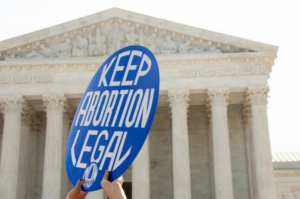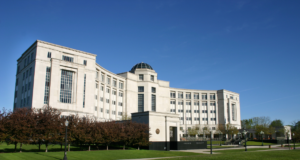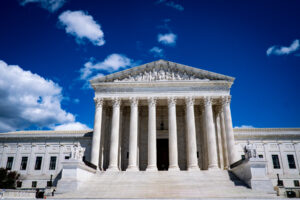Justices question South Carolina’s supermajority mandate to remove monuments
3 min read
South Carolina lawmakers agreed to move the Confederate flag from atop the statehouse dome in Columbia in 2000 when they adopted the Heritage Act, which also required a two-thirds vote of the General Assembly to alter any historical monument or structure.
That standard has frustrated efforts to change building and street names on colleges and in communities across the state, but other than the city of Greenwood battling to remove “colored” from a plaque honoring World War I soldiers, the 21-year-old law had not been directly challenged in court.
That changed this week when the South Carolina Supreme Court, at the urging of Republican state Attorney General Alan Wilson, heard a lawsuit questioning the constitutionality of the Heritage Act’s General Assembly two-thirds supermajority vote requirement.
Wilson issued an opinion last July, finding the Heritage Act passes muster, but the supermajority requirement is questionable. In Wilson’s view, it should take only a simple majority vote to alter a monument or building name.
The entire law is unconstitutional claims the lawsuit filed by Columbia City Councilman Howard Duvall; former state Sen. Kay Patterson, D-Columbia; and Jennifer Pinckney, widow of late state Sen. Clementa Pinckney, D-Jasper, the pastor at Charleston’s Emanuel AME church killed with eight parishioners in 2015 by Dylan Roof.
The Heritage Act protects monuments from 10 wars and those honoring “any historic figure or historic event.”
During an hour-long hearing Wednesday in which “confederate” was never mentioned, several jurists on the five-justice panel raised questions about the law, including a provision that upholds the South Carolina Legislature’s power even if courts rule the two-thirds threshold is unconstitutional.
“If this lawsuit had been filed in the fall of 2000, I don’t think anybody would raise the question of ripeness. We’d simply be talking about whether or not the General Assembly can enact an unconstitutional statute,” Associate Justice John Cannon Few said. “They can’t. And when they do, it’s ripe.”
Few asked attorney Kenneth Moffitt, representing Senate President Sen. Harvey Peeler, R-Gaffney, whether it was the chamber’s position the two-thirds supermajority was constitutional.
When Moffitt said, “Yes,” Few replied, “What legal principle do we look to as to where to draw the line, because if two-thirds is proper, why not make it 80 percent? Why not make it 90 or 100 percent, and we’ll just elevate the statute far beyond what the constitution would ever require?”
Attorneys for Duvall, Patterson and Pinckney said the three are personally vested because they or family members are “historic figures” under the law.
As a Columbia city councilman, Duvall argued the Heritage Act preempts local elected officials from making decisions about local memorials, statues and monuments.
Patterson maintains he, not state lawmakers, should be able to alter his own legacy marker in Round O, his birthplace. Pinckney makes the same claim regarding a memorial honoring her late husband in Marion County to be dedicated this summer.
Lawyers for Peeler and House Speaker Rep. Jay Lucas, R-Hartsville, countered that lawmakers were within their authority to pass the act in 2000 to “protect how South Carolina tells the story of its history and people.”
Chief Justice Don Beatty said it also is within lawmakers’ authority to resolve the legal questions now before the court, calling the litigation a failure to legislate.
“There are bills pending in both houses now, I do believe, that would accomplish getting rid of this statue, but it can’t get out of committee,” he said. “If it does not get out of committee, it will never get a vote, whether two-thirds or not.”
This article was originally posted on Justices question South Carolina’s supermajority mandate to remove monuments







